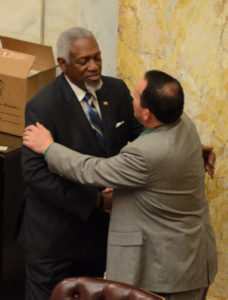By Steve Brawner
© 2017 by Steve Brawner Communications, Inc.
Here’s how Arkansas state politics really works: a disconnected majority often matters far less than a passionate few.
Certainly, the majority matters – particularly on Election Day. That’s when 1.1 million out of 3 million Arkansans went to the polls in November and cared deeply about who won the presidential race but not always some of the other races, including state legislative ones.
Once the campaigning ends and governing begins, Arkansas state politics becomes more about very concerned groups – “stakeholders,” they are called – who know those legislators well and lobby them on their particular issues. Hang around the Capitol when the Legislature is in session, and you’ll see 135 legislators and a governor being influenced by a relatively small number of lobbyists attending committee meetings and really paying attention on behalf of their groups – those groups usually being composed of ordinary Arkansans with legitimate concerns, so there’s nothing inherently wrong with this. Their arguments often will carry the day.
And that leads us to guns at Razorback games.
It all started when Rep. Charlie Collins, R-Fayetteville, introduced a bill that would have allowed college faculty and staff with a concealed carry permit to carry guns on campus. His logic was that they could deter crazed killers from targeting the campuses and, if necessary, shoot those killers if the campus police took too long to arrive. The bill was strongly opposed by the colleges and universities and by a small band of red-shirt-wearing moms, but it passed the House easily and was amended in the Senate when Gov. Asa Hutchinson and some senators decided it needed a training requirement of 16 hours.
That’s when Arkansas’ most powerful group of passionate true believers, the National Rifle Association, stepped in. Arkansas is a pro-gun state anyway and so are all Republican legislators and many Democrats, but many NRA members believe Second Amendment rights are basically absolute, and they’ll base their votes entirely on that issue.
In other words, they’re passionate, which matters a lot. The political reality is that while each House member represents 30,000 constituents and each senator represents 86,000, what they’re most worried about are their party primary voters: 3,000-6,000 in the House and 10,000-14,000 in the Senate. Many legislators desperately want an A rating from the NRA because anything less might draw a primary opponent or cost them hundreds of votes – enough to make the difference.
As a result, the final bill, passed into law, went much farther than the original. In fact, it allowed anyone age 21 with a concealed carry permit and eight additional hours of training to carry a gun not just on college campuses but almost anywhere, including the State Capitol and Arkansas Razorbacks football games.
I haven’t seen a poll about that, but I suspect the majority of Arkansans are pro-gun but would be uncomfortable with that mixture of 70,000 people, youth, alcohol, frustration and firearms. But what the polls say about a particular issue often means little, anyway. What matters is not if a large majority of voters disinterestedly share an opinion. What matters are who cares, how much, and what they’ll do about it. Gun rights supporters care a lot, and they vote.
The story moved into the sports section and made national news. On Tuesday, the Southeastern Conference joined the conversation, saying the new law might negatively affect the Razorbacks with recruiting, officiating and, ominously, “scheduling.” When that happened, opinions across the state became less disinterested.
Legislators were then in a no-win situation between guns and the Hogs. A bill was written that would exempt sports stadiums along with the University of Arkansas for Medical Sciences and the Arkansas State Hospital, an inpatient psychiatric facility. That bill passed the Senate and then, on Thursday, the House despite the NRA’s objections, but legislators know their votes will be remembered.
Even a passionate few, or a passionate many in the NRA’s case, don’t get everything they want. Still, the general rule remains: On any particular issue, a passionate minority will have far greater influence than a disconnected majority, and legislators will continue to listen to those who are speaking.

